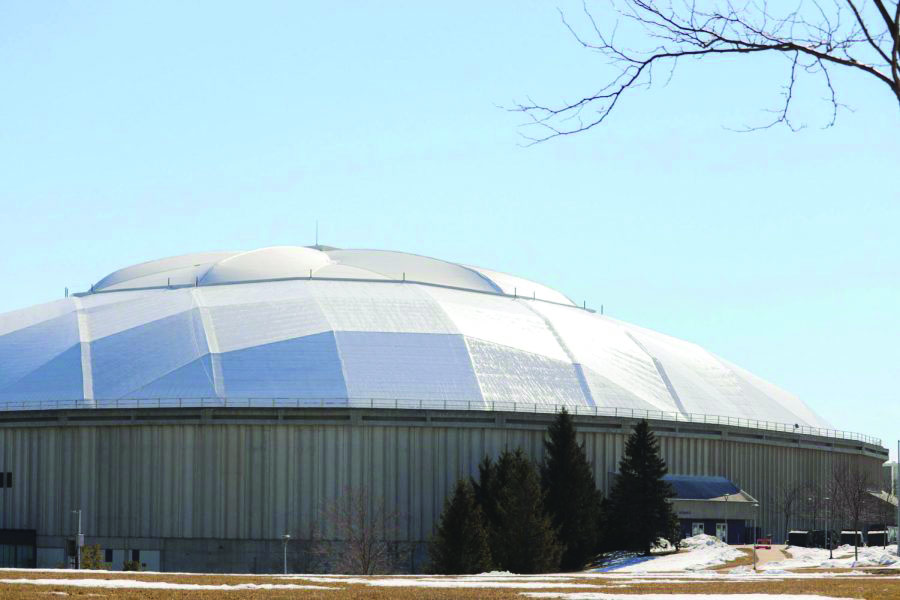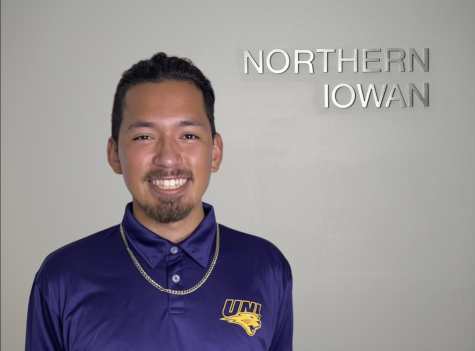Board of Regents meets in Cedar Falls
The Board of Regents approved the replacement of the fabric portion of the roof of the UNI-Dome, with construction planned to take place in Spring 2023.
Sep 21, 2022
Projects and budgeting for the future of UNI
Last week, the Iowa Board of Regents met and approved the Fiscal Year 2024 appropriations request for about a total of $630 million. About $530 million are for the university appropriations request.
The demand factors in inflation rates, which are close to the highest rates experienced in the U.S. during the 1970s and early 1980s. The outcome of this request will be decided during legislation in January.
Currently, UNI’s Five Year capital plan for funds is $113 million, which hasn’t changed from last year. Many of the funds requested would cover renovations, parking/institutional roads, construction, utility improvements and future projects.
The university has a backlog of more than $212 million in building renewal, a 1 percent increase from last year. Personnel focus their resources on a priority system that addresses safety issues, educational support and repair of facilities equipment. For the 2023 fiscal year, about $34 million in building renewal projects have been identified.
UNI-Dome and other renovations
The $8 million project proposed would replace the center portion of the UNI-Dome roof. In 1976 the Dome was built with an air supported fabric roof system. It was the first in the U.S. to have fabric as a roof. In 1999, it was replaced with a higher-quality fabric. In 2010, the outer metal was replaced, giving it the current white roof, due to hail damage and carried a 30-year warranty through 2040.
This project would recoat the perimeter concrete support beam as well as install safety lines and anchor points on the entire roof to improve safety for the maintenance staff.
The board approved the fabric portion of the Dome, and construction will take place in Spring 2023. This will be funded through general fund building renewal, gifts and grants, department renewal and replacement funds and a possible sale of bonds.
The largest single project in UNI’s capital improvements plan is a three-year project for improvements to UNI-Dome restrooms and club box seating renovations, which will come to a total of $42 million, also funded through gifts and grants.
President Nook requests
President Mark Nook during the meeting presented three requests from the university. The first request was an $8 million increase in the general education fund. Half of the fund would go to tuition differentiation and the other half would go toward educators for Iowa in order to address the teacher shortage in the state.
The second request was the special purpose fund for the UNI@IACC partnership with Iowa community colleges for about $2 million.
The last request was for economic development as the university is looking for an additional $400,000 for the Family Business Center and Institute for Decision Making.
Nook also reported that in the beginning of 2013, 23 percent of high school graduates didn’t choose to go to college. In 2019 the number jumped to 33 percent.
“We’re at a point now that we don’t even have the students coming out of high school going on to any college credit meaning that 70 percent goal [of high school graduates continuing on to college] is going to be extremely difficult if we can’t change this trend and get more of our students to go on to some form of education beyond their high school,” Nook said. “We are creating a problem in this state in being able to fill the workforce needs for those jobs that require a four year degree, and in many cases a two year degree or professional degree of some sort.”
UNI@IACC is currently partnered with four community colleges and received about $4 million in one-time federal American Rescue Plan (ARP) support; these funds are allocated through the governor’s office, and 80 percent of these funds will support UNI@IACC. The remaining will be for personnel and operating expenses. From their partnership there has been an 18 percent increase in transfer student enrollments according to Nook. UNI is requesting $2 million for Fiscal Year 2024, which will provide four student support specialists and double the total number of communities involved in the UNI@IACC partnership.
The $4 million request in differentiated tuition fees is to help make sure tuition is lowered for all students and to honor the university’s mission to provide an affordable education for Iowa.
For economic development, these funds would help expand the UNI Family Businesses Center (FBC) and the Institute for Decision Making. FBC has an important role for many of Iowa’s family-owned businesses. The expansion would also address work issues and further economic and technological innovations.This program serves 3,500 unique businesses in all 99 Iowa counties.
Athletics flagged
The UNI Athletics Department was flagged yellow in its audit report. Being flagged yellow could seriously affect a department or area within the university. The flagging involved a difficult issue requiring the attention of upper management, the audit report said.
The internal audit report stated, “The Athletics Administration audit was performed to evaluate if proper controls are in place and determine whether opportunities for improvement exist for current administration processes.”
Some of their primary recommendations include reviewing financial management practices to maintain a balanced budget and positive account balances, and to ensure that travel authorizations and advances are completed in a timely fashion. The final recommendation was making the personnel action forms and termination checklists in accordance with university policy.
“We also made recommendations related to updates needed for their handbook from their timeliness of reporting and improving the internal communication of any potential NCAA violations based on the severity and their required timelines,” Chief Audit Executive Debra Johnston said.
Astrobiology underground with undergrads
Joshua Sebree, associate professor in the Department of Chemistry and Biochemistry, is currently the principal investigator of UNI’s base program awarded by the Space Grant Consortium. The project, titled “Wind Cave as a Terrestrial Analog for Possible ExoBiological Environments off Earth,” is focused on how a wind cave can serve as a model system for icy moons of the solar system. The team explores caves to find water and hydrothermal vents.
Two caves, Wind Cave National Park near Mount Rushmore and Cold Water Cave in Winneshiek County, Iowa, are the focus of the team’s explorations. Currently Sebree’s team is following organic trails and studying how water flows and where the energy comes from for food. Then the team goes to the end of the organic trail to find a colony of microbiology. The different water pools have different types of life. At the Wind Cave there were, “95 unique and unidentified genomic materials, and it is exceedingly pristine, amazing stuff,” Sebree said. This project provides a unique opportunity for 50 students and seven departments at UNI. Many alumni come back to the project to continue to share their wisdom.
Orientation
After three years, this year’s orientation took place in person, including an overnight stay. Some emerging themes that have popped up in looking at this year’s incoming class include shifting student and parent expectations, heightened concerns for student preparation, staffing challenges and increased student engagement. It was reported that during Panther Welcome week there was an 18 percent increase in participation compared to last fall.
Some heightened concerns about students that UNI officials raised were finances, academic readiness and the sense of being overwhelmed.
All three universities are experiencing a shortage in student workers in regards to orientation. Illnesses are still a current challenge in staffing orientation. According to the Student Affairs presentation, the Panther Pantry has also felt an increase in demand with 600 more pounds of food being distributed in the first two weeks of fall 2021 semester.
Construction
The basketball/volleyball practice facility will be under construction for $15 million, and wrestling practice facilities for $5 million. The outdoor soccer field will also be under construction for about $2 million during the 2025 fiscal year. The sources of funds for this construction will be through gifts and grants.









